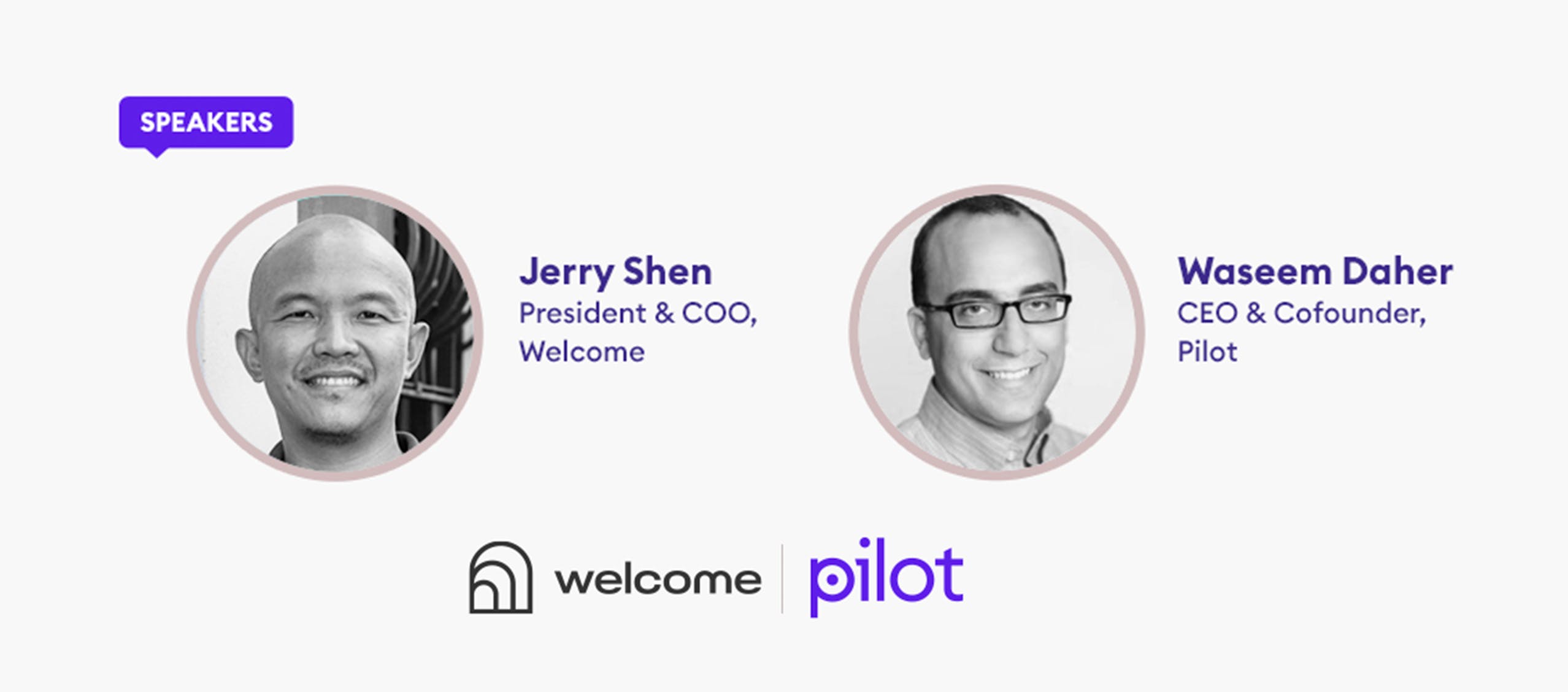Startup Stories: How Welcome Staged a Turnaround
A confirmation email has been sent to your email.

Even by startup standards, Welcome has had quite a ride. In March 2020, things looked bad: first the company’s business was severely impacted by COVID-19, and then the Airbnb they were based out of literally caught fire.
Six months later, however, it was a different story. Welcome’s virtual events platform immediately resonated with its enterprise audience, and the company closed a $12M Series A led by Kleiner Perkins in November 2020.
Pilot’s co-founder and CEO Waseem Daher recently sat down with Welcome co-founder and COO Jerry Shen to talk about Welcome’s challenges, how they staged a successful pivot, hiring for early-stage success, and more. Read excerpts from the discussion below, and watch the entire 50-minute interview here.
About Welcome
Waseem Daher:
So give us the 30 second pitch on Welcome.
Jerry Shen:
It was kind of interesting because we happened to be a company that went through both the winter ’20 batch, which was the last in-person YC batch, and the summer ’20 batch, which was the first virtual YC batch because we had to pivot in between, which we’ll talk about in a bit.
But, the idea behind Welcome, it’s a high end venue for virtual events, right? When we looked around at the virtual event landscape, and all the platforms that were out there, we’re like, “You know, none of these platforms really work if you’re a company that wants to have your own branding on the platform, if you want… Not to pick on Zoom, but as you come in, you just see a bunch of blank faces and awkward silence, right? What if you wanted to have music going, and high definition video, and chat that doesn’t feel like IRC from the 90s, right? So, we just built a much more elevated experience for companies to run events that we feel like can feel like a Apple product launch, and that’s what we set out to build, and I think hopefully we’re on the way there.
Deciding to Pivot
Waseem Daher:
How did you get here? Obviously that pivot is a big part of the story, but tell us a little bit more about the journey that brought you here and what you were up to before, and sort of what caused you to realize it wasn’t working, and what led to this particular idea?
Jerry Shen:
Back in 2019, we were actually working on a food startup, which is completely different than virtual events. My cousin is actually the co founder of Caviar, one of the first food delivery startups. So, he helped fund us to work on an idea that we really didn’t know much about, but there was a lot of potential, which was taking the idea of food delivery, but then linking together restaurants and food wholesalers. So, we got into YC with that idea. Big market, big opportunity, but the unfortunate fact of the matter of the industry is that it’s very old and people are very reluctant to change.
So, I just remember day after day of waking up at like one in the morning, going into these wholesale food markets in San Francisco, and talking to guys that didn’t understand technology…I think pretty early on, we realized, okay we really don’t have the right team. Somebody’s going to solve this problem, but it’s probably not going to be us.
Waseem Daher:
Was there a nail on the coffin moment, where you were like, “Okay, it’s time to pull the plug on this?” The reason I ask is I think it’s hard, because you get so invested in your idea, and you’re like, well this is what we started the company to do. I think it’s obviously a very big decision to have the fortitude to be like, well, look, this is not working, let’s do something new. Was there a certain, particular moment that catalyzed that for you? How did you reach that conviction?
Jerry Shen:
I think about half way through YC, it was pretty clear that we needed to pivot, and then the final nail in the coffin was COVID because every single one of the customers that we had gotten, and we hadn’t gotten many up to that point, and all of our future customers had to shut their doors, right?
And on top of that, the week before lockdown started in San Francisco, our Airbnb actually caught on fire, and this was a week before Demo Day. So, I don’t know if you believe in the supernatural, but if that isn’t a sign, all your customers closing down and your office and your home burning down, I don’t know what is.
How Welcome Chose Where to Pivot
Waseem Daher:
So, the fates conspired basically to tell you that this thing was not working. Okay, it’s like, fine, it’s time to go back to the drawing board, time to figure out something new. Obviously tough because you’re kind of starting from square one again. How did you decide to hone in on this particular idea?
Jerry Shen:
Yeah. It’s really weird, because hindsight is kind of 20/20. So, if I told you what our background is, you would think, these guys are idiots, why didn’t they just do this in the first place instead of spending four years on these other ideas?
So, Roberto, our CEO, and I, we actually used to host events, like in-person conferences. So, after we got acquired by Yahoo, we were doing the whole rest and vest thing, we were kind of bored, and we started these meetup groups for entrepreneurs, because we were suddenly in this position where we’d never managed people before, but all of a sudden we were managing fairly large teams. We had no idea what we were doing. So, we started a meetup group for entrepreneurs to learn leadership, and we would go through books and things like that. This was back in 2013.
So, that grew and grew and grew, and eventually it became a conference. We had rented out big venues, we had huge production teams, we’d have A list speakers, the whole nine yards, and we loved it. We ran that for about two years before handing it off. So, when we started to work on all these startup ideas, it honestly never occurred to us to do anything in the event space, because we were thinking, okay, let’s do something that can make money, what are some business opportunities that were out there. But for us, the event stuff, we didn’t make any money from it, it was just a passion project so honestly it never occurred to us.
But, looking back, it’s like, oh man, we just love events. We love the feel of giving people a great experience, and that was a thing that made us viscerally react when we started going to these virtual events because we saw the biggest brands in the world putting on these experiences that just felt so awkward on Zoom, on Google Hangouts, on Slack. They would cobble all these different tools together, people were on mute half the time, or their slides were wrong. It was a complete disaster, and we were like, “Oh my god, this is terrible.” We know, because we planned these events, right? We’re just like, “There’s got to be a better way.”
Waseem Daher:
I love that. I love that.
Jerry Shen:
Yeah, so really that’s more of a hindsight thing. I think without COVID, and without everybody experiencing what the current state of virtual events are, I honestly don’t think it would have ever occurred to us.
Waseem Daher:
I love that narrative, because actually, and we talked about this earlier before this, we have sort of the same story with this company, which is “okay, we do bookkeeping, we do tax prep, we do forecasting in this technology enabled way.” And in our very first company, when we struggled to do our finances, we actually wrote a lot of software internally to help us out with the process.
So, the germ of this idea actually existed two companies ago, and actually when Oracle was acquiring that company, we met with their finance team, we told them about all the sophisticated tech we’d built, and they were like, “You gotta do a company around this. This is amazing, incredible technology.” And we laughed, and we just completely ignored them. We did a whole other company between that first company and this one.
And so, to your point, it’s like if you look retrospectively back at the narrative, oh, you kind of see where all the dots were, but the true path there was not anywhere near as clean or as linear as it might seem in retrospect. That’s funny.


